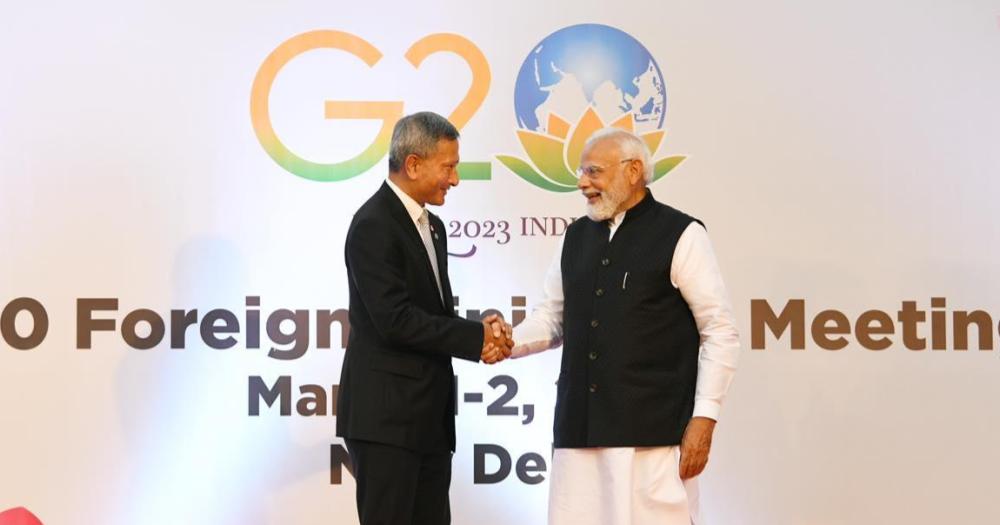Follow us on Telegram for the latest updates: https://t.me/mothershipsg
Singapore's foreign minister Vivian Balakrishnan was in New Delhi, India from March 1 to 2, attending the G20 Foreign Ministers' Meeting.
The G20 is being held in India in 2023, and Singapore is attending proceedings as an observer.
While at the G20 FMM, Vivian spoke about the bifurcation of technology and economies, the importance of supporting multilateralism to deal with global challenges, and the need for countries to work together to counter radicalisation and terrorism.
Price taker
Singapore is not a member of the G20, but has been an active participant at the G20 for 12 of the past 13 years, first attending in 2010.
At the first plenary session, Vivian spoke on the need for reforms, to strengthen multilateralism, food and energy security, as well as development cooperation.
He said that Singapore was a"price-taker" because of its small size and lack of clout, as compared to other countries, but shared some "candid remarks" from that perspective.
Regardless, all G20 nations needed to comply with the United Nations Charter and to defend the rights of all nations, large or small, to "have their independent sovereignty and territorial integrity fully respected".
He also said that the war in Ukraine "needs to stop."
Support for multilateralism
Vivian also called on the gathered leaders to support multilateralism, not just in words, but also to exercise the self-restraint necessary for a rules-based system, even if it may not give everyone everything they want, all the time.
He spoke of the need for reform of multi-lateral organisations like the United Nations and the World Trade Organization to reflect "current realities" and "future and emerging needs."
In the second plenary session, Vivian expressed sympathy to Turkey and Syria for the recent earthquakes that have killed thousands, and spoke of Singapore's efforts in fighting the trafficking of illegal drugs and self-radicalisation leading to terrorism.
US and China need to engage each other
Vivian also said that the U.S. and China, as the two largest superpowers in the room, needed to engage "intensely and comprehensively with each other."
They need to de-escalate tensions, especially around Taiwan and the South China Sea, he added.
Vivian also reminded the group of the need to deal effectively with climate change, saying "we need to fulfil the Paris Agreement".
Vivian also met with several foreign ministers on the sideline of the meeting, including Penny Wong of Australia.
He also met the foreign ministers of the UAE, the UK, France, Saudi Arabia, and Brazil.
An obligation to those not in the room
Once again, the war in Ukraine hung over the G20 meeting as United States Secretary of State Antony Blinken and Russia Foreign Minister Sergei Lavrov clashed.
According to the BBC, Blinken accused Russia of an "unprovoked and unjustified war", while Lavrov accused the West of "blackmail and threats".
The talk was so heated that India's foreign minister, S Jaishankar, said that "the gap between the countries (on Ukraine) was too much", and the differences "could not be reconciled".
India's Prime Minister Narendra Modi referenced the difficult situation by saying that countries should acknowledge that "multilateralism was "in crisis", according to the Times of India.
Citing the events of recent years such as financial crisis, climate change, pandemic, terrorism, and wars, Modi said that it "clearly shows that global governance has failed."
Addressing those gathered at the G20 FMM, he said that world leaders had an obligation to "those who were not in this room", and that, "We should not allow issues that we cannot resolve together to come in the way of those we can."
Modi said that India's G20 presidency "tried to give a voice to the global south", and reminded the richer countries in the room that many developing countries were "struggling with unsustainable debts while trying to ensure food and energy security".
Related stories:
Top image via Ministry of Foreign Affairs, Singapore
If you like what you read, follow us on Facebook, Instagram, Twitter and Telegram to get the latest updates.
